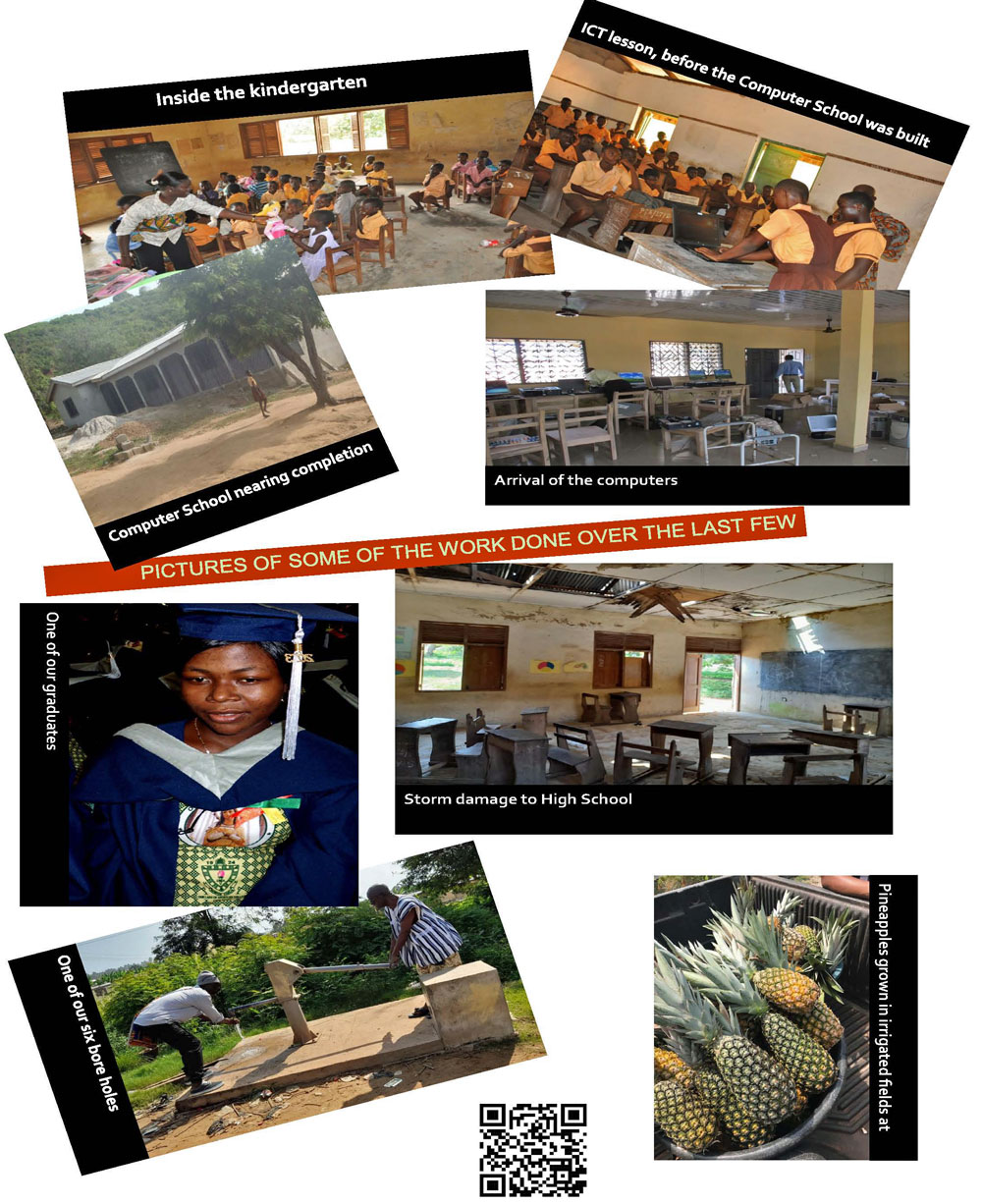As some of you will know, as well as being a deacon here at Saint Edmund’s, I am also a chief in Ghana – not an honorary chief, but a real chief, with a real job to do. I am the Nkosuohene, or Chief for Welfare and Development, of Nankesido (also spelt Nankesedo) a small coastal village in Ghana in West Africa. I was made a chief 18 years ago, partly to honour the memory of my late adoptive father who came from there. Nankesido is a very poor community and most of my people make their living from farming, fishing, driving, labouring, selling goods and agricultural produce, or from other work such as hairdressing and sewing. My job, together with the charity I set up to help me in the work, is to promote the welfare of people in and around Nankesido and, in particular, to improve the education of young people there.
Since we started work, we have done a lot.
Our very first major project was to replace the large, appalling, broken-down shed that served as the kindergarten and infants’ school. Our new building has separate classrooms and a dining room. We named it after Saint Edmund of Canterbury, out of gratitude to our parishioners who helped to pay for it.
More recently, we built and equipped a brand new computer school. Incredible though it may seem, when the government of Ghana introduced ICT Skills into the national curriculum, the school in Nankesido – like most other schools in Ghana – had to teach the subject without having a single computer except, in our case, for a single laptop a parishioner had given them. We changed all that by building and equipping a large, beautifully-decorated computer school so that our children could learn ICT in a 21st Century environment.
We don’t just build new schools. We also undertake major repairs to existing buildings. When I visited Ghana in August 2022 I found that the roof of our Junior High School had been so severely damaged by a storm that not a single one of the eight or nine classrooms was usable. By the time the children went back to school in September after the vacation, we had completely reroofed the school and redecorated every classroom.
The COVID lockdown hadn’t stopped us, either. Being unable to undertake any major projects, instead we sank six boreholes to provide free water to several communities, including a home for disabled people who operate their own farm which our borehole now helps them to irrigate.
Over the years we have helped numerous young people through secondary school, vocational school, college, and university by paying, or assisting with fees, accommodation and educational materials: 39 students through Senior High School; 13 through Teacher Training College, 6 through Nursing College and 6 through University, while 17 students have received bursaries for apprenticing as seamstresses, tailors, hairdressers, mechanics and other trades.
We have distributed hundreds of items of sports kit that we have been given to individual school children and teams, and we have helped countless poor individuals and families with one-off grants or longer term support to help with buying school books, uniforms and clothes, paying medical bills and hospital fees, paying for house repairs, and with other day-to-day needs.
None of this work would have been possible without the generous help of parishioners of St Edmund’s, not only through their own personal donations but also through their schools, workplaces and other contacts: for example, it was a parishioner who persuaded the British Humane Association to fund a substantial part of the building of the computer school, and it was another parishioner who put us in touch with the Brazilian Embassy who gave us the computers. Many others have helped us with gifts of sewing machines, sports kit, medical aids and other such welcome items.

Scan to donate now
Money goes a long way in Ghana. A few pounds will pay for a school uniform or a pair of shoes; £50 will pay for a whole term for a child at senior high school; £300 will pay for an apprenticeship and £500 for a vocational course such as electrical engineering; £1,500 pays for training a teacher or a nurse, or for sinking and casing a borehole and providing the pump; £2,000 pays for a three-year university course. But while money goes a lot further in Ghana than it does here, we still get through a lot of money because of all the work we do, and our funds were drastically depleted by the need to repair the school roof last year.
We would be grateful for any amount that you can give to help us with our work, and the second collection this weekend is for my charity, the Nankesido Education and Welfare Trust, or NEWT for short (Registered Charity Number 1148470). If you would like to give us a cheque (we still accept them!) they should be made out to NEWT. There will be gift aid envelopes in church for taxpayers who would like us to claim the tax they have paid on their donations. If you would like to make a direct bank transfer, our bank details are: NEWT (Nankesido Education & Welfare Trust) Account number 73341607; Sort code 20-05-57. Please contact the Office if you would like to Gift Aid your offering.
I want to assure you that every penny you give us goes to help the people of Nankesido and the surrounding area. As a registered charity, we have rigorous procedures in place to ensure that money is spent properly, while our overheads are zero, apart from bank charges on international transfers to Ghana and shipping costs of goods we send out. My people in Nankesido are very grateful for the help you have given them and their children in the past, and I thank you now for your continuing generosity.
Deacon Seán
DONATE NOW VIA CHURCHSUITE
